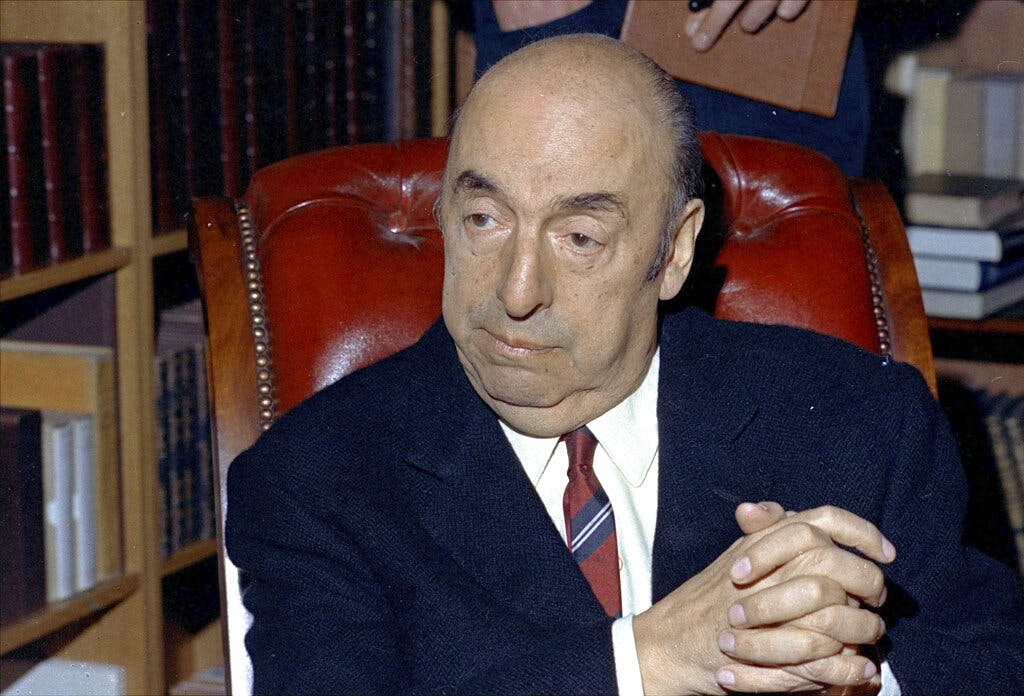Chilean Poet Neruda Was Poisoned, Nephew Says
Neruda, who was 69 and suffering from prostate cancer, died in the chaos that followed Chile’s 1973 coup that overthrew President Salvador Allende and put General Augusto Pinochet in power.

SANTIAGO, Chile — Forensic experts have determined that Chilean poet Pablo Neruda died of poisoning nearly 50 years ago, a family member of the Nobel Prize winner said Monday.
The disclosure by a nephew of the poet, Rodolfo Reyes, is the latest turn in one of the great debates of post-coup Chile. The long-stated official position has been that Neruda died of complications from prostate cancer, but the poet’s driver argued for decades that he was poisoned.
There was no confirmation of Mr. Reyes’ comments from forensic experts from Canada, Denmark, and Chile who are scheduled to publicly release a report Wednesday on the cause of Neruda’s death.
The report is set to be released almost 50 years after the death of the poet and Communist Party member and 12 years after the start of a judicial investigation into whether he was poisoned, as his driver Manuel Araya maintains.
Mr. Araya told the AP earlier this month he was confident that the forensic findings would support his assertion the poet died after being given “an injection in the stomach” at the clinic where he was hospitalized. Mr. Araya said he first heard that version of events from a nurse.
Neruda, who was 69 and suffering from prostate cancer, died in the chaos that followed Chile’s September 11, 1973, coup that overthrew President Salvador Allende and put General Augusto Pinochet in power.
Neruda’s body was exhumed in 2013 to determine the cause of his death but those tests showed no toxic agents or poisons in his bone. His family and driver demanded further investigation.
In 2015, Chile’s government said it was “highly probable that a third party” was responsible for Neruda’s death. The poet was reburied in his favorite home overlooking the Pacific Coast last year.
In 2017, a team of international scientists determined that Neruda did not die of cancer or malnutrition, rejecting the official cause of death but not saying what he did die of.
“The fundamental conclusions are the invalidity of the death certificate when it comes to cachexia as a cause of death,” one of the panel’s experts, Aurelio Luna, said at that time. “We still can’t exclude nor affirm the natural or violent cause of Pablo Neruda’s death.”
Neruda, who was best known for his love poems, was a friend of Allende, who killed himself rather than surrender to troops during the coup led by Pinochet.
Neruda was traumatized by the military takeover and the persecution and killing of his friends. He planned to go into exile, where he would have been an influential voice against the dictatorship.
But a day before his planned departure, he was taken by ambulance to a clinic in Chile’s capital of Santiago where he had been treated for cancer and other ailments. Neruda officially died there on September 23, 1973, from natural causes.
Suspicions that the dictatorship had a hand in the death remained long after Chile returned to democracy in 1990.
Mr. Araya told the AP last month he still thinks that if Neruda “hadn’t been left alone in the clinic, they wouldn’t have killed him.”
He recalled that on Neruda’s instructions, on Sunday, September 23, the poet’s wife, Matilde Urrutia, and he were at the mansion to pick up the suitcases that would be taken to Mexico the following day. In the middle of the afternoon Neruda asked them to come back quickly. He died that same night.
During his life, Neruda accumulated dozens of prizes, including the 1971 Nobel Prize for Literature, but in recent years criticism has appeared from feminist groups over a rape he committed in the 1930s and which he recounted in his book “I Confess That I Have Lived.”
International forensics experts several years ago rejected the poet’s official cause of death as cachexia, or weakness and wasting of the body due to chronic illness — in this case cancer. But at that time they said they had not determined what did kill Neruda.
In an interview with the AP, Mr. Reyes said forensic tests carried out in Danish and Canadian labs indicated a presence of “a great quantity of Clostridium botulinum, which is incompatible with human life.” The powerful toxin can cause paralysis in the nervous system and death.
As a lawyer in the judicial case over his uncle’s death, Mr. Reyes said he has access to the forensic report, which was carried out after the same group of experts said in 2017 that there were indications of a toxin in the late poet’s bones and a molar.
The lab tests concluded that the toxin was administered when the poet was alive, Mr. Reyes said.
